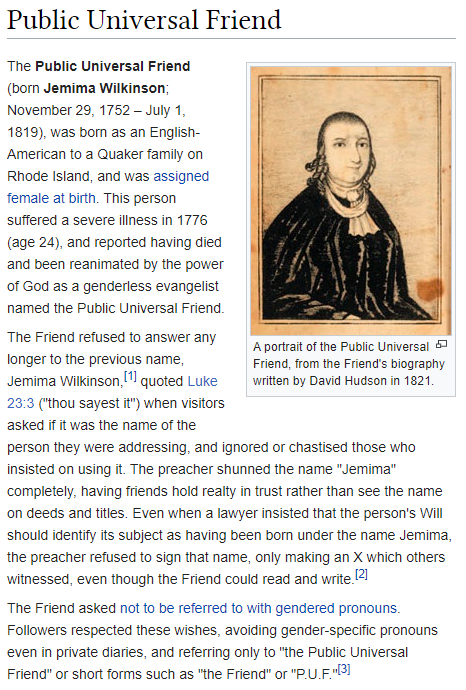Fact is stranger than fiction.
In 1776, an American Quaker woman named Jemima Wilkinson from Rhode Island suffered a severe illness and came back from a near-death experience as "The Public Universal Friend": a nonbinary evangelist-prophet who shunned both birth name and gendered pronouns (which the PUF believed embodied Paul's statement in Galatians 3:28 that "there is neither male nor female" in Christ), choosing to wear androgynous clothing and begin preaching a gospel of Christian universal salvation (that anyone, regardless of gender had equal access to the Inner Light of God), as well as other things like the abolition of slavery, throughout northeastern America:
Public Universal Friend - Wikipedia
In 1776, an American Quaker woman named Jemima Wilkinson from Rhode Island suffered a severe illness and came back from a near-death experience as "The Public Universal Friend": a nonbinary evangelist-prophet who shunned both birth name and gendered pronouns (which the PUF believed embodied Paul's statement in Galatians 3:28 that "there is neither male nor female" in Christ), choosing to wear androgynous clothing and begin preaching a gospel of Christian universal salvation (that anyone, regardless of gender had equal access to the Inner Light of God), as well as other things like the abolition of slavery, throughout northeastern America:
Public Universal Friend - Wikipedia
The Public Universal Friend[note 1] (born Jemima Wilkinson;[note 2] November 29, 1752 – July 1, 1819)[2] was an American preacher born in Cumberland, Rhode Island, to Quaker parents. The Friend suffered a severe illness in 1776 and reported having died and been reanimated as a genderless evangelist named the Public Universal Friend, and afterwards shunned both birth name and gendered pronouns. In androgynous clothes, the Friend preached throughout the northeastern United States, attracting many followers who became the Society of Universal Friends.[3]
The Public Universal Friend's theology was broadly similar to that of orthodox Quakers, believing in free will, opposing slavery, and supporting sexual abstinence. The most committed members of the Society of Universal Friends were a group of unmarried women who took leading roles in their households and community. In the 1790s, the Society acquired land in western New York where they formed the township of Jerusalem near Penn Yan, New York. The Society of Universal Friends ceased to exist by the 1860s. Many writers have portrayed the Friend as a woman, and either a pioneer or a fraud, while others have viewed the preacher as transgender or non-binary.
The Person Formerly Known as Jemima Wilkinson - Los Angeles Review of BooksThe Public Universal Friend's theology was broadly similar to that of orthodox Quakers, believing in free will, opposing slavery, and supporting sexual abstinence. The most committed members of the Society of Universal Friends were a group of unmarried women who took leading roles in their households and community. In the 1790s, the Society acquired land in western New York where they formed the township of Jerusalem near Penn Yan, New York. The Society of Universal Friends ceased to exist by the 1860s. Many writers have portrayed the Friend as a woman, and either a pioneer or a fraud, while others have viewed the preacher as transgender or non-binary.
MERE MONTHS AFTER the signing of the Declaration of Independence, a strange figure on horseback began to circulate throughout the New England colonies. The body atop the horse responded to the name of Public Universal Friend, and the double column of riders who followed behind their leader all believed that the Friend’s body housed the Spirit of God, sent to Earth to deliver an urgent message. Paying little heed to worldly skirmishes between Revolutionaries and Redcoats, the Friend galloped across the countryside announcing that the Apocalypse was drawing nigh. The Public Universal Friend exhorted audiences to heed heaven-sent warnings meant to save those who would listen, believe, and endeavor to live righteously — that is, according to the Friend’s advice.
God had selected a handsome female body for the Universal Friend to inhabit, one that had recently belonged to Jemima Wilkinson of Cumberland, Rhode Island. Jemima was known as an intelligent and attractive 23-year-old woman when she was struck by fever on October 5, 1776. Her family summoned a doctor when her condition worsened, but there was little to be done; the patient seemed doomed by the 10th, when her illness climaxed in babbling delirium.
Miraculously, the fever broke and the body calmed. According to family lore, Jemima’s body had chilled in death before it warmed and revived. The other Wilkinsons were astonished when her body arose from the bed on October 11. But if the family at first rejoiced that Jemima had been spared, they were mistaken: the newly risen patient announced that Jemima had died and that her body had been requisitioned by God for no less holy a purpose than the salvation of humankind.

God had selected a handsome female body for the Universal Friend to inhabit, one that had recently belonged to Jemima Wilkinson of Cumberland, Rhode Island. Jemima was known as an intelligent and attractive 23-year-old woman when she was struck by fever on October 5, 1776. Her family summoned a doctor when her condition worsened, but there was little to be done; the patient seemed doomed by the 10th, when her illness climaxed in babbling delirium.
Miraculously, the fever broke and the body calmed. According to family lore, Jemima’s body had chilled in death before it warmed and revived. The other Wilkinsons were astonished when her body arose from the bed on October 11. But if the family at first rejoiced that Jemima had been spared, they were mistaken: the newly risen patient announced that Jemima had died and that her body had been requisitioned by God for no less holy a purpose than the salvation of humankind.

Last edited:


